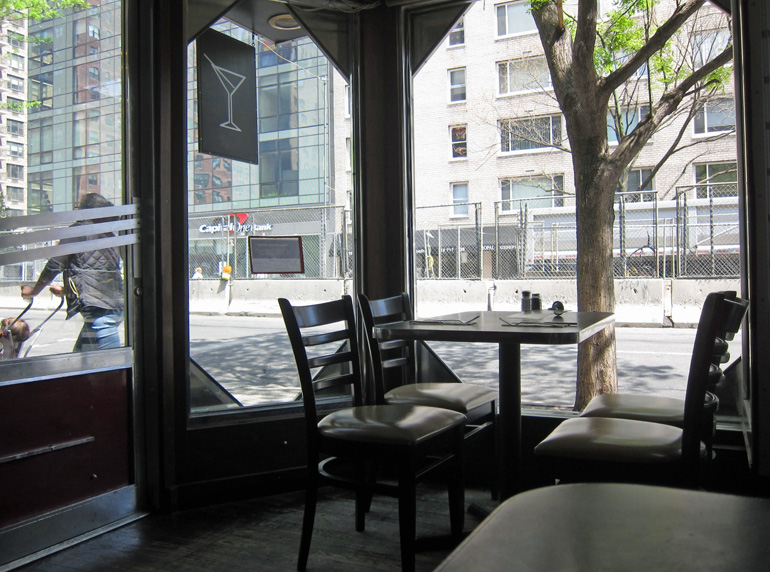Gotham Diary:
Between Sickness and Health
13 May 2014
In The Human Condition, Hannah Arendt couched her discussion of human affairs in terms of the Greek polis of classic antiquity. Many readers objected, charging Arendt with a sentimental nostalgia for an Ancient Greece that, if it ever actually existed, was quite short-lived. But Arendt was not singing the praises of bygone times. She was merely describing the foundation of politics in the West. It was in the polis that genuine political action first appeared — in the recorded history of the West, that is — and as it was not only at this time, but in the form of a negative reaction to the muss and tumble of political life that the speculative philosophy of Plato and Aristotle was born — another Western foundation — it made a great deal of sense to analyze that particular moment. Arendt particularly wanted to know how political action stood with relation to the human condition as she understood it. Because her writing is impelled by the heat of her ideas rather than by the rhetorical accommodation of the reader’s ignorance — precisely, in short, because Arendt assumes that her reader knows everything that she knows — The Human Condition is a demanding read. But, as difficult books go, I give it top marks for payoff — for the rude satisfaction of grappling with ideas and really understanding them. There is no wizardry in Hannah Arendt — just a lot of learning.
Something else made the polis an appealing object of study, and this was the very opposite of antiquarianism. The political world of the polis soon passed away, but the world in which it had arisen persisted for centuries — the human condition remaining much as it was, and had been, even by the time of the polis, for several millennia. Arendt’s snapshots of the polis — of the private household, in which bodily needs were seen to; of the workshop, in which artisans made objects of durable use and artists chiseled sculptures; of the agora, in which citizens discussed political possibilities among other matters of public and commercial interest — portrayed a way of life that did not change until modern times. Her analysis of human life in the polis established a Degree Zero for a fully human world in which political action constituted the arena of new and unpredictable things.
Needless to say, we don’t, in these fine times, look to politics for new and unpredictable things, and we haven’t done so since the onset of the Industrial Revolution. For a couple of hundred years now, human beings have been working hard, not to change the political order of human life, but rather to alter its natural order.
Consider medicine. I’m certainly considering it; in a few hours, I’ll be seeing a new specialist. This is hardly an uncommon thing for a 67 year-old man to be doing, but in fact I have been seeing specialists since my late thirties. I have been living in a strange new zone that is neither “health” (if I were healthy, I wouldn’t need the doctors) nor “illness” (modest and widely-spaced medical interventions allow me to live a life that, at least to me, looks and feels normal enough). The language for discussing life in this zone does not exist, possibly because the zone has no generally-recognized name. My attempts to describe it almost always fail, because the people to whom I’m talking clearly understand me to be suffering from secret illness. Illness there may be, but of suffering there is little or none.
It helps to know how new this zone is. Why, it did not even exist when I was born! The focus of medical attention in those days was on the wonderful new antibiotic drugs, unprecedented lifesavers that vanquished mortal illness. Where people had once sickened and died, now they recovered — hallelujah!
The heart surgeons followed, with equally stirring achievements. Again, very sick patients were saved from certain death.
With cancer treatments, we see the opening of the new zone. For cancer patients, the zone is called “remission.” The disease is checked, sometimes only temporarily, sometimes more lastingly. Much remains to be learned about cancer, but one interesting thing about the history of cancer treatments — very interesting to me, indeed — is that treatments that failed to check cancer might well turn out to block the progress of other diseases. Remicade is such a treatment: it didn’t do anything for cancer patients, but it brought relief to Crohn’s Disease patients. It has brought relief to me. Whatever’s wrong with my autoimmune system is unaffected by the treatment; only its effects are blunted — just about completely.
The same is true of the many people who are enjoying life thanks to life-sustaining HIV drugs.
In any case, it is no surprise that our thinking has hardly caught up with our powers. This is true on almost every front that has seen the alteration of the natural condition of human beings, and nowhere more than with regard to the environmental consequences of those alterations. A lot of what we’ve done to “improve” the conditions of human life has degraded the natural life of everything.
It is possible that the specialist will tell me that I have crossed the line into real illness. I do hope not, but I’m somewhat strengthened by the meditation that has been forced upon me by life in the new zone, which has lasted, as I’ve said, for many years. And I’m grateful for the benchmarks that Hannah Arendt so firmly planted in The Human Condition. More than any other thinker — no; with a success achieved by no other thinker — she has shown me where I am.

